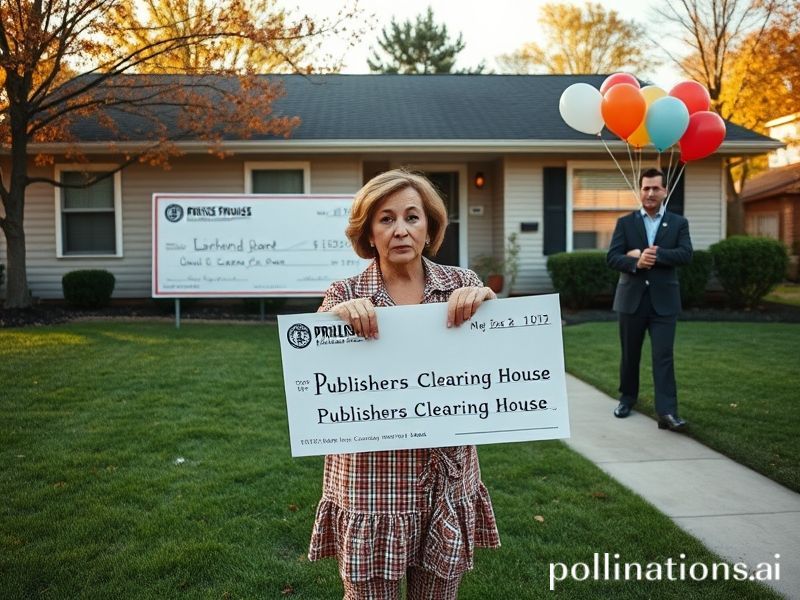Publishers Clearing House Goes Global: How an American Mailbox Miracle Became the World’s Favorite Pyramid Scheme
Publishers Clearing House, that quintessentially American fever dream of mailbox miracles, has quietly metastasized into a global phenomenon. From Lagos to Lahore, the same oversized check—printed in Comic Sans for maximum sincerity—now arrives in WhatsApp forwards, Instagram ads, and those browser tabs you swear you didn’t open. The prize patrol may still wear navy blazers in Ohio, but their spiritual cousins stalk the planet in knock-off polos, promising untold riches in exchange for your grandmother’s email password.
In the Global South, the Clearing House archetype has hybridized with local folklore. Manila spam bots dangle “Mega Millions Manila” jackpots; Nairobi hustlers run “Safari SuperPrize” raffles; São Paulo influencers hawk “Clearing Casa” giveaways between butt-lift testimonials. Same grift, different flag. The United Nations could save a fortune on translators if it just circulated one universal message: “Congratulations, you’ve been pre-selected to lose your life savings.”
Europe, ever the continent that invented both the Enlightenment and the bureaucracy to strangle it, has responded with GDPR fines and public-service TikToks starring bored Nordic actors warning Grand-mère not to click. Brussels regulators treat Publishers Clearing House like an invasive species, a kudzu vine of optimism tangling through the single market. Meanwhile, the UK—Brexit’s greatest self-own—now allows its pensioners to be targeted by sweepstakes firms operating out of Gibraltar, because sovereignty apparently means the freedom to be scammed in English again.
The economics are deliciously perverse. PCH’s parent company, currently pivoting to “digital entertainment,” rakes in micro-transactions from mobile games that look suspiciously like slot machines wearing a candy coat. Last year they booked $1.2 billion in revenue, roughly the GDP of Belize, a country that at least sells you real mangoes. Analysts in Tokyo call this the “hope arbitrage”: monetizing the delta between what humans dream and what statistics permit. It’s a margin that widens every time a TikTok astrologer says Mercury is in retrograde and your luck is about to change.
China, never one to miss a monetizable emotion, has franchised the model into WeChat mini-programs where users plant virtual trees that might, if the stars align and you watch enough diaper ads, sprout an iPhone. State media calls it “positive energy consumption”; cynics call it Publishers Clearing House with Chinese characteristics. Either way, the house always wins, and the house is now partly owned by a sovereign wealth fund whose chairman has a standing invite to Davos. You can practically hear Klaus Schwab purring: “You’ll own nothing and still enter our sweepstakes for the chance to win everything.”
The geopolitical angle is equally bleak. Intelligence agencies have noticed that the same data-harvesting funnels used by sweepstakes marketers are handy for identifying the gullible, the desperate, and the ideologically unmoored—a trifecta ripe for disinformation ops. Last month, an FBI bulletin warned that foreign troll farms are cloning PCH-style sites to vacuum up personal details faster than you can say “Ed McMahon never actually delivered those checks.” The Cold War had nukes; the lukewarm war has pop-ups.
And yet, hope springs infernal. In refugee camps across Turkey and Jordan, aid workers report migrants pooling what little cash they have to buy “global lottery” tickets hawked on Facebook Marketplace. The jackpot is always a visa, a house, a future that doesn’t smell of disinfectant. When asked why they believe, one Syrian father shrugged: “We already lost everything once; probability can’t hurt us anymore.” Statisticians weep; poets nod; Publishers Clearing House adds another line item.
Conclusion: The oversized check has become the flag of a borderless nation-state whose citizens are bound not by language or geography but by the conviction that someone, somewhere, will eventually pay for their Netflix. Until that glorious day, the machinery will keep humming, algorithms fine-tuned to the frequency of human delusion. And somewhere in a server farm cooled by Icelandic glacial melt, a bot calculates the exact emoji that will make Grandma click “confirm subscription.” The jackpot isn’t money; it’s the moment before disappointment arrives. Collect that feeling, digitize it, sell it back to us at 9.99 a month. Congratulations, you’ve already won.







